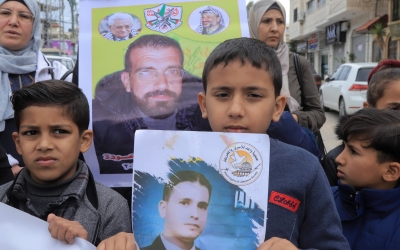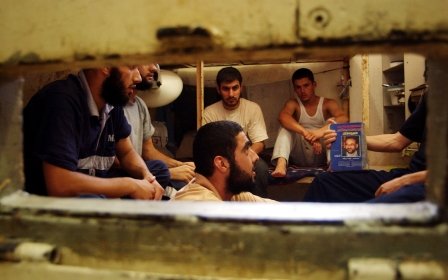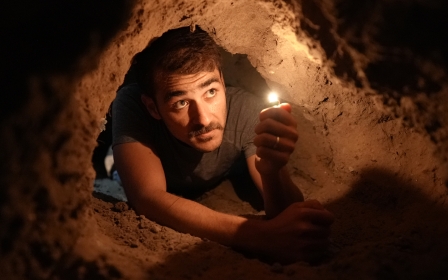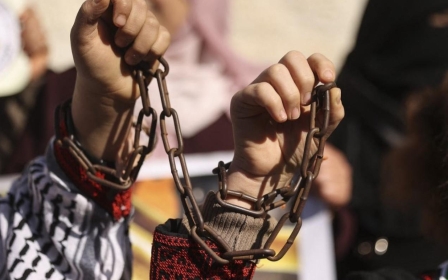Heatwave in Israeli jail: An 'unbearable' life for Palestinian prisoners
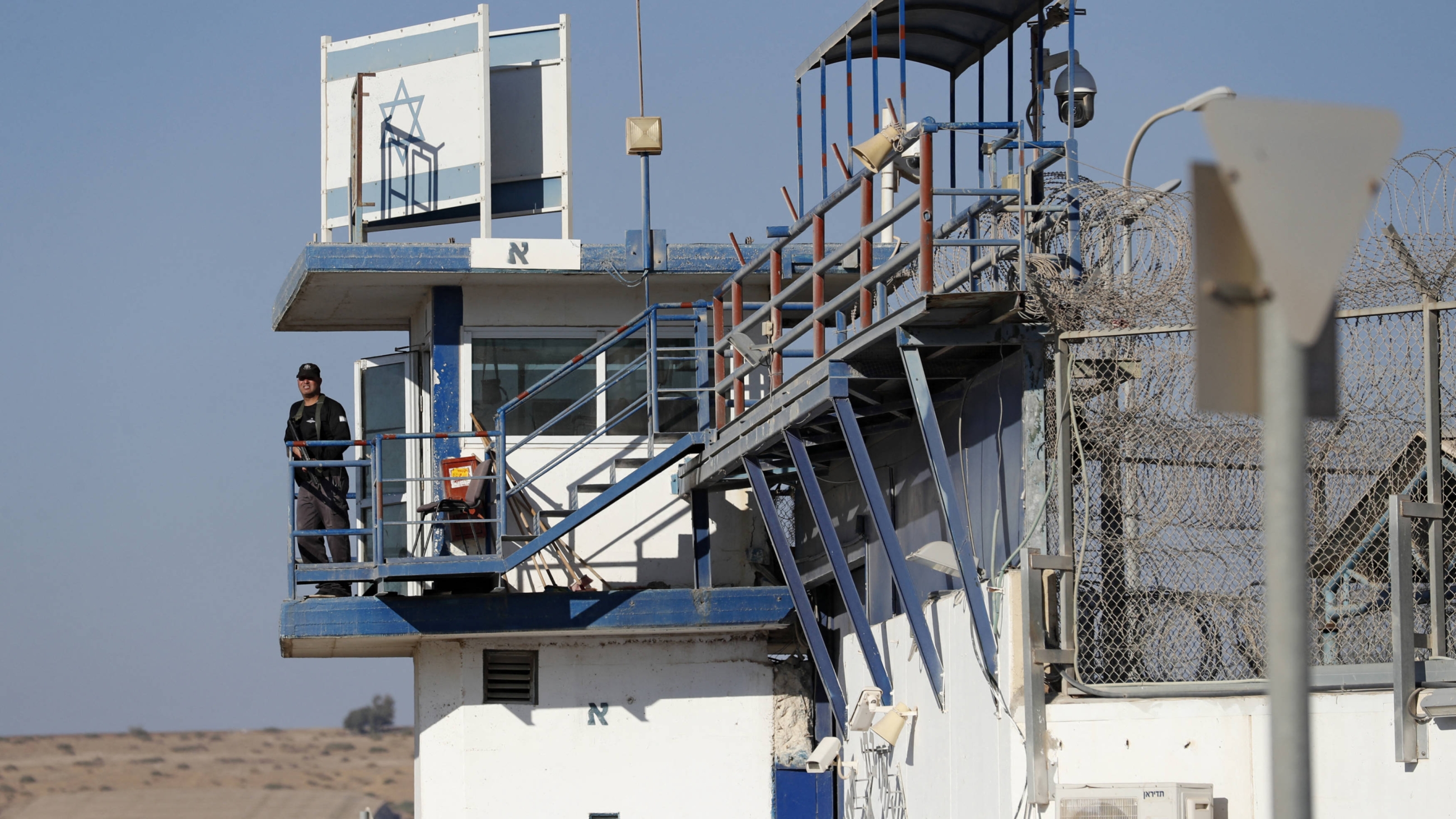
The past five years of sweltering summers remind Yacoub Abu Asab of the Israeli prisons where he spent 15 years of his life.
For Palestinian detainees, the hot season is itself a prison within a prison.
Israel's restrictive measures compound the woes of prisoners made to suffer through yearly heatwaves in prisons located in the desert or near hot, humid valleys that make life unbearable, the 51-year-old former detainee told Middle East Eye.
Abu Assab spent his last sentence of six years in Gilboa and Megiddo prisons in northern occupied Palestine where he says the heatwaves get more severe every year.
In Israeli prisons detainees regularly experience shortness of breath and general discomfort due to the absence of cooling systems and small overcrowded prison cells, which in some prisons hold up to eight detainees.
New MEE newsletter: Jerusalem Dispatch
Sign up to get the latest insights and analysis on Israel-Palestine, alongside Turkey Unpacked and other MEE newsletters
Israel's prisons are built with concrete, which retains heat, and lack proper ventilation.
Meanwhile, some cells have no windows, some are located underground, while others have single windows overlooking enclosed areas that don't let the breeze circulate.
“Inside the cell, the prisoners try to reduce the heat themselves, so they are forced to shower at least five times a day in order to protect their bodies from over-sweating or from skin diseases,” Abu Asab said.
“They also spray water on their beds and pillows to produce a little coolness, but that quickly fades away.”
Prisoners are allowed one small fan in each room. But this only moves the hot air around and doesn't reach the four corners of the room.
Prison authorities are also known to cut off electricity from the cells during the day, meaning prisoners cannot even use the fan.
Meanwhile, the hot plate used for cooking and heating food makes the cells more stuffy. As a result, some prisoners avoid using it during the summer, eating cold, canned food instead, according to Abu Asab.
“In our normal situation outside the prison, we can’t think, work, sleep, or live in general if we don’t have an air conditioner, so you can imagine what being deprived of cooling does to prisoners who are already suffering from harsh conditions and unfair sentences,” he said.
'An oven'
Bayan Faroun, 28, was detained for 40 months in the Damon prison, located near the coastal city of Haifa, and describes the detention facility, which holds 30 female Palestinian prisoners, as “an oven”.
“We shared one fan that was useless, and unfortunately our prison conditions were more difficult than the rest of the prisoners, as the shower was located outside our section and we were only allowed to use it once a day at hours determined by the prison administration,” she said.
'Prisoners are forced to shower five times a day in order to protect their bodies from over sweating or from skin diseases'
- Yacoub Abu Asab, former prisoner
Meanwhile, the only refrigerator for the prisoners was located outside their section and was closed daily from 6 pm to 7 am, depriving prisoners of access to cold food and drinks.
“Because of the intense heat and our need for cold water, we used to bring in the vegetable box and turn it into a small refrigerator by placing water bottles inside, which we had previously frozen, and cool anything we wanted by placing it on top of the bottles, but after a few hours it becomes warm again,” Faroun said.
Many female prisoners suffer from bullet wounds sustained during their arrest that sting in the heat.
However, Israa Jaabis, from Jerusalem, suffers from deep burns that cover 50 percent of her body and make the high summer temperatures particularly agonising.
The vehicle she was travelling in exploded just before she was arrested in 2015 for allegedly attempting to carry out an operation against Israeli soldiers.
Faroun said Jaabis, with whom she shared a prison section, could sometimes be found crying from pain caused by the effect the heat has on her burnt skin.
Jaabis also experienced shortness of breath that got worse as the humidity increased in the prison, which, like many others, lacks cooling and ventilation.
'Piece of hell'
There are more than 5,000 Palestinians currently incarcerated in Israeli prisons. While some of these may be in hotter locations than others, all are exposed to uncomfortable temperatures.
Amina al-Taweel, a researcher at the Palestine Centre for Prisoner Studies, told Middle East Eye that the cells holding Palestinian prisoners are closed from all sides, with no proper ventilation, while the fans inside the rooms only circulate hot air.
The prisoners who suffer most from the heat are detained in prisons located in particularly extreme locations - Negev, Rimon, Nafha, and Eshel, in Israel's south. These hold nearly half of the total number of Palestinian prisoners.
The detainees have described these locations as “a piece of hell”, where “their bodies roast in the intense heat".
Taweel said several cases of heatstroke, fainting, and shortness of breath have been recorded this year, adding that the conditions are dangerous for ill prisoners who already don't have access to adequate medical care.
“Instead of helping them, the prison administration sometimes punishes the prisoners by confiscating the fans,” she added.
Last July, the Naqab desert saw temperatures reach 50 degrees Celsius, making it impossible for prisoners to go out into the prison yards.
Meanwhile, the sweltering heat also brings out poisonous reptiles, insects, and scorpions, which can easily find their way into prison sections, further endangering the lives of prisoners, said Taweel.
But as summer ends, Palestinian prisoners are forced to begin preparing for the winter season, which brings with it another challenge - the cold - alongside the continuing pressure applied by Israel's prison authorities, whatever the season.
Middle East Eye delivers independent and unrivalled coverage and analysis of the Middle East, North Africa and beyond. To learn more about republishing this content and the associated fees, please fill out this form. More about MEE can be found here.


